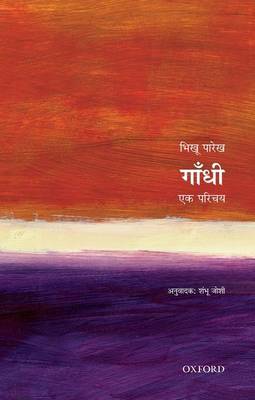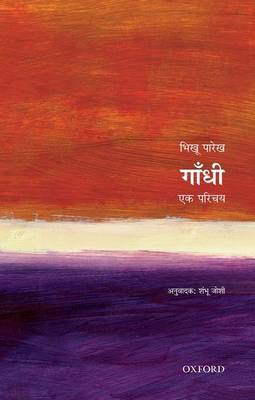
Door een staking bij bpost kan je online bestelling op dit moment iets langer onderweg zijn dan voorzien. Dringend iets nodig? Onze winkels ontvangen jou met open armen!
- Afhalen na 1 uur in een winkel met voorraad
- Gratis thuislevering in België vanaf € 30
- Ruim aanbod met 7 miljoen producten
Door een staking bij bpost kan je online bestelling op dit moment iets langer onderweg zijn dan voorzien. Dringend iets nodig? Onze winkels ontvangen jou met open armen!
- Afhalen na 1 uur in een winkel met voorraad
- Gratis thuislevering in België vanaf € 30
- Ruim aanbod met 7 miljoen producten
Zoeken
Omschrijving
Gandhi (1869-1948) was one of the few men in history to fight simultaneously on moral, religious, political, social, economic, and cultural fronts. During his time as a lawyer in South Africa he developed his strategy of non-violence: the idea of opposing unjust laws by non-violent protest, which he made the basis of his successful struggle against British rule in India.
In this Very Short Introduction to Gandhi's life and thought, Bhikhu Parekh outlines both Gandhi's major philosophical insights and the limitations of his thought. He looks at Gandhi's cosmocentric anthropology, his spiritual view of politics, his unique form of liberal communitarianism, and his theories of oppression, non-violent action, and active citizenship. He also considers how the success of Gandhi's principles was limited by his lack of coherent theories of evil, and of state and power, and how his hostility to modern civilization impeded his appreciation of its complexity.
Gandhi's life and thought has had an enormous impact both within and outside India, and he continues to be widely revered, as one of the greatest moral and political leaders of the twentieth century.
In this Very Short Introduction to Gandhi's life and thought, Bhikhu Parekh outlines both Gandhi's major philosophical insights and the limitations of his thought. He looks at Gandhi's cosmocentric anthropology, his spiritual view of politics, his unique form of liberal communitarianism, and his theories of oppression, non-violent action, and active citizenship. He also considers how the success of Gandhi's principles was limited by his lack of coherent theories of evil, and of state and power, and how his hostility to modern civilization impeded his appreciation of its complexity.
Gandhi's life and thought has had an enormous impact both within and outside India, and he continues to be widely revered, as one of the greatest moral and political leaders of the twentieth century.
Specificaties
Betrokkenen
- Auteur(s):
- Uitgeverij:
Inhoud
- Aantal bladzijden:
- 216
- Taal:
- Engels
Eigenschappen
- Productcode (EAN):
- 9780190121075
- Verschijningsdatum:
- 10/02/2021
- Uitvoering:
- Paperback
- Formaat:
- Trade paperback (VS)
- Afmetingen:
- 112 mm x 170 mm
- Gewicht:
- 136 g

Alleen bij Standaard Boekhandel
+ 48 punten op je klantenkaart van Standaard Boekhandel
Beoordelingen
We publiceren alleen reviews die voldoen aan de voorwaarden voor reviews. Bekijk onze voorwaarden voor reviews.











